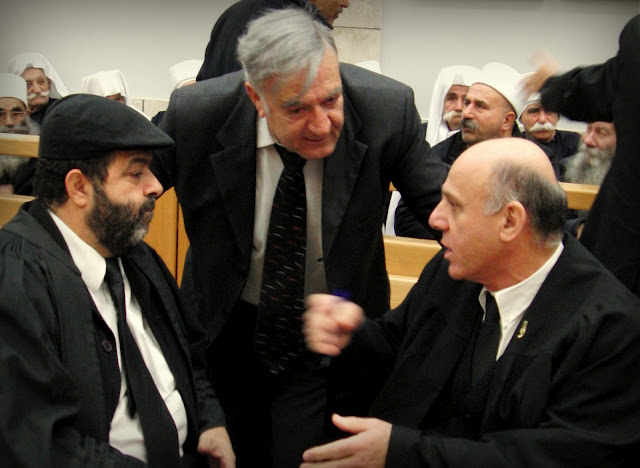Court to Decide on Adalah's Motion to Cancel Two Charges Issued against Arab MK Mohammed Barakeh
Judge Daniel Be’eri of the Tel Aviv Magistrates’ Court announced at a court hearing held on 18 September 2011 that the court would decide on 26 October 2011 on Adalah’s motion to cancel two of the charges issued against Arab Member of Knesset (MK) Mohammed Barakeh, Chair of the Democratic Front for Peace and Equality (Jabha / Hadash) political party. Adalah argued that the charges fall within the scope of Barakeh’s parliamentary immunity. At the court hearing, Adalah Attorneys Hassan Jabareen and Orna Kohn presented a series of examples in which indictments were not filed against MKs, or in which MKs relied on their parliamentary immunity despite the far more serious nature of these cases.
The legal defense team from Adalah submitted a request for parliamentary immunity to apply to two of four charges that were joined together in a single indictment, which relate to Barakeh allegedly “insulting a public servant” (police officers) and obstructing their work on two occasions. The first occurred in early 2006 in a demonstration in Tel Aviv against the Second Lebanon War, and the second in July 2007 during a demonstration by families of the victims of October 2000 against a visit by the Defense Minister Ehud Barak to Nazareth.
Regarding the other two charges, the first claims that MK Barakeh obstructed the work of Israeli soldiers during a demonstration in May 2005 in the West Bank village of Bi’lin; on this occasion Barakeh allegedly tried to prevent the arrest of a Palestinian youth. The second charge alleges that in July 2006 MK Barakeh “assaulted” a right-wing activist who attempted to attack demonstrators in Tel Aviv in another demonstration against the Second Lebanon War.
Attorney Hassan Jabareen, General Director of Adalah, brought a series of cases before the court in which the Attorney General’s (AG’s) Office has refrained from issuing indictments against right-wing MKs in cases of assault against Israeli police and security officers, or in which the courts decided that the MKs were protected by parliamentary immunity for such actions.
One of the cases cited by Attorney Jabareen dates back to the mid-1990s, when former MK Gutman, from the pro-transfer Moledet political party, prevented the arrest of a right-wing activist who was demonstrating in favor of settlers in Hebron. Gutman used a stick to assault Israeli soldiers, grabbed handcuffs from a soldier and prevented the detainee from being handcuffed by the army. Gutman then handcuffed the detainee to his own hand and fled the scene with her.
In another case, settler MK Arieh Eldad prevented an army bulldozer from demolishing homes in the settler outpost of Amona. A solider then approached MK Eldad, who raised his hands and was led aside. Not only did the AG’s Office not press charges against Elad for obstructing the work of the soldiers, but Eldad also brought a case against the soldier, the details of which confirmed the events detailed above.
Attorney Jabareen then quoted from a series of decisions issued by various levels of courts over the years – magistrates, district and Supreme Court – as well as decisions made by the Knesset’s Ethics Committee. In these decisions MKs were exonerated in complaints filed against them for “insulting a public servant” or for making public statements in contradiction of “state sovereignty,” etc.
Following the court hearing, Attorney Jabareen told assembled journalists that MK Mohammed Barakeh was the first MK to be tried in connection with his participation in demonstrations, despite the fact that such activity is an integral part of his work as an elected representative. Attorney Jabareen stressed that the motion to apply parliamentary immunity had been made in spite of the fact that MK Barakeh denied all the charges made against him.
After the hearing MK Barakeh stated that, “The content of the indictment, consisting of four charges, the conduct of the trial, and the justifications used by the AG’s Office to date prove once again what we have known all along, that we are facing a dangerous case of political persecution that aims to deter activists and Arab citizens of Israel as a whole from conducting political activity, as well as the forces that support them and share in their struggle.”














